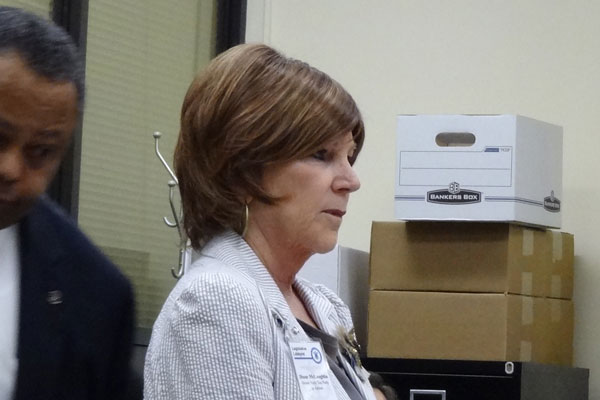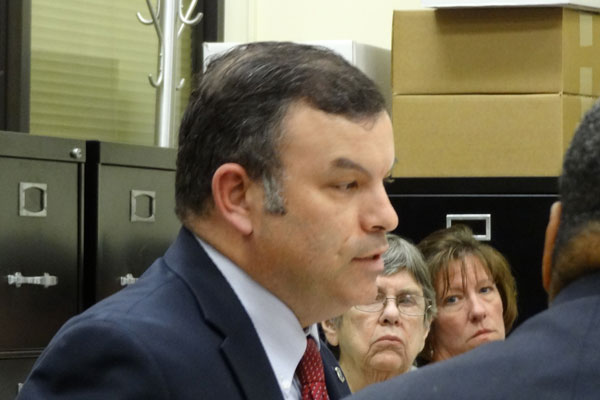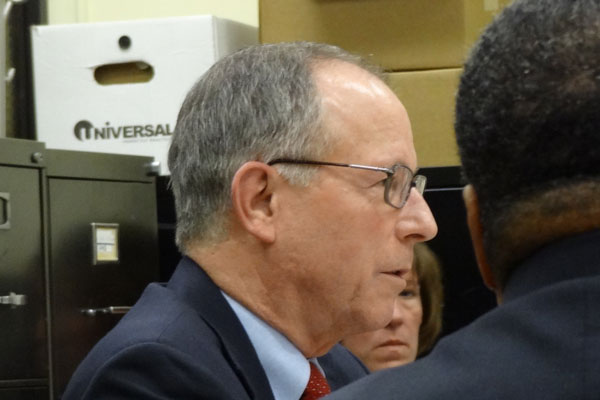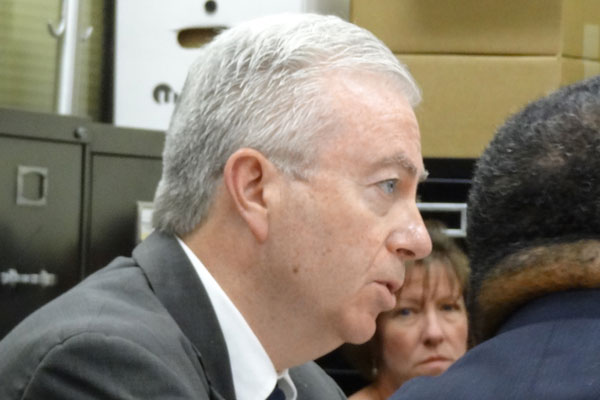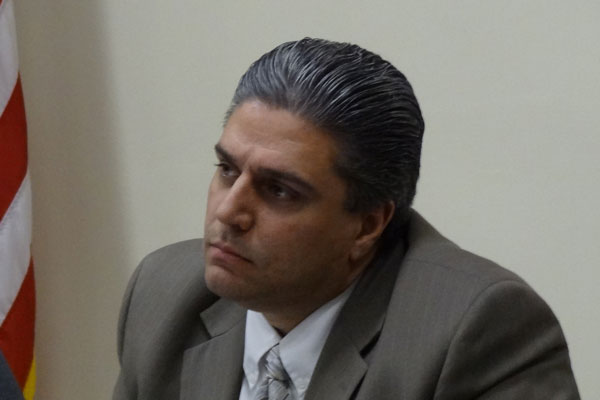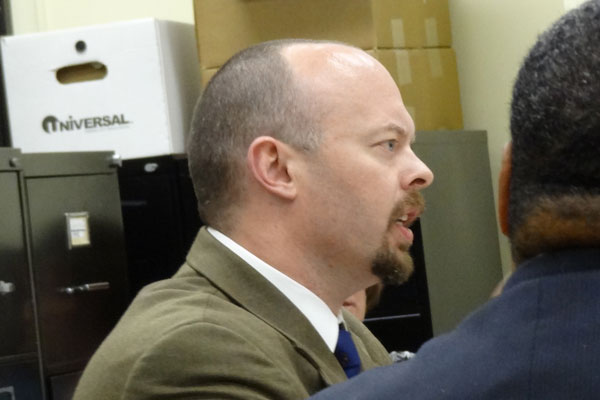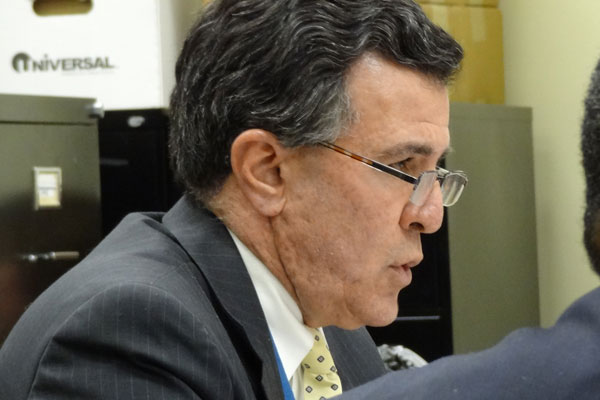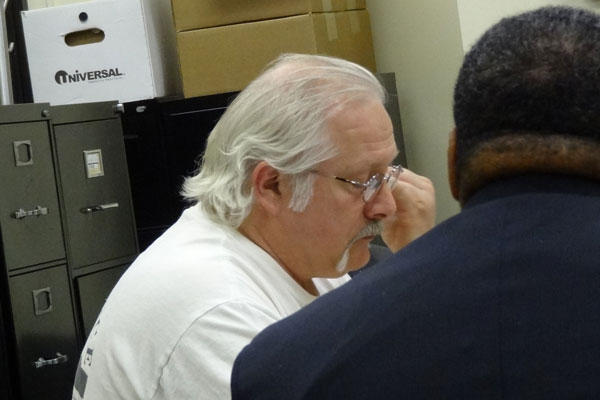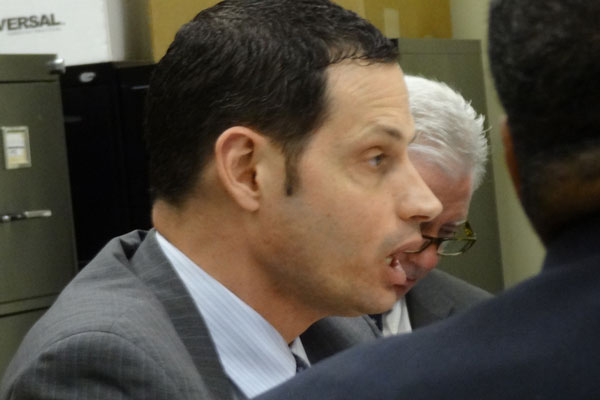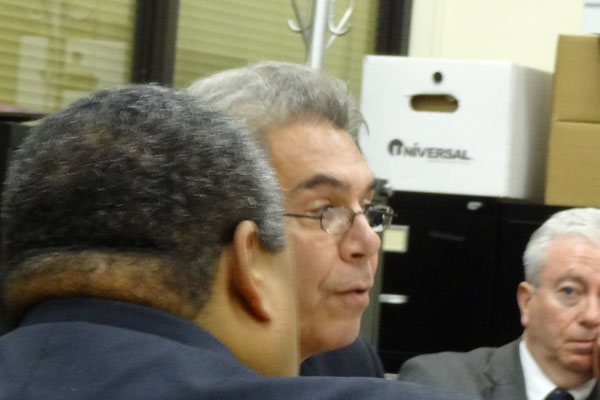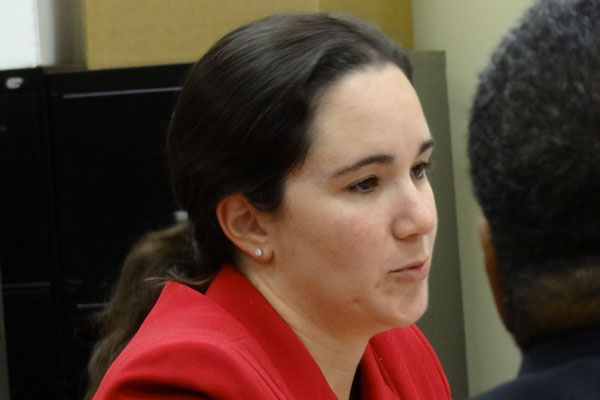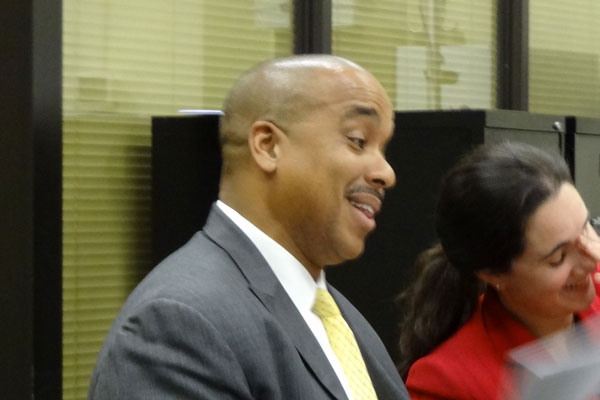03/20/12 – House Committee on Labor
4:30 p.m.
I’m settled in to room 135 at the State House for a House Labor hearing in a surprisingly small room for bills that ought to be as controversial as any in the legislature’s hopper.
On the table, this evening, are the following bills:
- H7272 would move the date for notification of potential teacher layoffs from March 1 to June 1.
- H7286 would allow teachers to work in public schools without joining the unions or paying fees in lieu of joining.
- H7613 looks like it adjusts overtime laws for air carrier employees.
- H7757 would give city/town councils ratification authority over school department collective bargaining agreements and eliminate the Caruolo Act.
- S2228 “would allow the department of labor and training to verify employee quarterly wage report information for the Workforce Investment Board.
The room is nearing a dozen people, including Harry Staley of RISC, Lisa Blais of Ocean State Tea Party in Action, and a number of teacherly women.
4:42 p.m.
More regular faces… Susan Wynne RI Tea Party, the various labor folks, including firefighter rep. Paul Valetta of “cooking the books fame.” Here’s Diane McLaughlin, an official lobbyist for Ocean State Tea Party in Action.
Chatter around the room suggests an expectation that it’s going to be a long hearing. Maybe I should make a run to the… umm… marble room.
5:00 p.m.
The television in one of the adjoining offices shows the floor session (although that’s not the right word, I don’t think) to still be in session.
As with school committee meetings during negotiating season, every Rhode Islander should make a point of attending at least a handful of committee hearings per year. It’s very instructive to experience the club-like feel.
I don’t mean just cordiality; that ought to be just basic ettiquette, but the chatting of the lobbyists amongst themselves, roping in the journalists, really applies a different shade to the giant public battles that we watch at home on our TV sets, computer monitors, and newspapers.
5:05 p.m.
Word is that the committee members are on their way… and excitement filled the room.
5:08 p.m.
Roughly 30 people in the room, including staff, reporters, and so on. I believe Dan Yorke calls that “Rhode-apathy.”
5:13 p.m.
At this point, we’re well over the 35-person capacity noted on the sign on the wall. Looking at the agendas of the other committees that are starting up right now throughout the building, it seems conspicuous that this hearing is in such a small space, with seating consisting mainly of uncomfortable plastic chairs.
Although, it is air conditioned, which is nice. If only I could figure out how to get on the public wifi — speaking of which, I hear the public wifi initially didn’t require a password, but so many employees were using it for their ipads, smartphones, and such that restrictions were necessary.
5:18 p.m.
All bills held for further study. S2228 has come and passed. Light lifting first, I guess.
5:20 p.m.
H7272. Rep. Russell Jackson speaking. This is the bill to move the layoff-notice bill. Jackson is offering the (common sense) explanation that school departments don’t know their state aid in March, making all budget estimates pure speculation.
5:23 p.m.
Chairwoman Anastasia Williams is asking if Jackson has run this by any labor leaders. Jackson says he’s filed it at the request of the town of Middletown. “No one else has reached out to me to discuss the bill.”
5:24 p.m.
Rep. Robert Phillips asked why Jackson picked June 1st rather than May 1st.
Jackson: That was the date that Middletown asked for. He’d be happy to discuss, but nobody’s asked about it.
5:25 p.m.
Williams says there are currently 9 committee members for this and 3 against. She’s asking anybody who is just going to repeat what’s been said to be easy.
James Parisi, Field Representative for the Rhode Island Federation of Teachers (RIFT), is objecting to the bill. He says the bill changes the date of actual terminations, including for cause. He asks that they limit the scope of the bill to the layoff notification date.
He offers May 15 for termination and support of measures that change the date for all layoffs.
“We’ve suffered mass layoff notices or termination notices for the past three years.” Central Falls was for bargaining leverage “more than anything else.” Providence last year. Woonsocket this year.
“We’re well aware that there were some recent budget issues that need to be addressed, but it’s unfathomable for us to imagine that the people who are running the Woonsocket school department didn’t realize that they needed at least one teacher.”
“It’s… laziness, ineptitude, political.”
5:30 p.m.
I’d note that my assessment has been that the unions like the March 1 notice date because it makes it more difficult for a school department to issue any notices at all. Any obstacle to adjusting workforces is helpful to the unions.
Williams is emphasizing communication and would “greatly appreciate it” if Parisi would extend to Jackson the opportunity to talk about common ground.
Her emphasis on getting it out of committee.
5:33 p.m.
Phillips wants to understand why the union wouldn’t want school departments to have more time to offer a notice for termination for cause so that they could work with the teachers to see if they could improve his or her performance.
Parisi: If a teacher isn’t informed that their job is on the line, they might not know that it’s coming. “The March 1 date pretty much requires” districts to sit down with the teacher.
“I’m worried that our teachers will lose the opportunity to show the improvement” that would save their job.
Phillips says, as an administrator, he would be telling the teacher all along that she’s not doing well.
Parisi notes that March 1 is just a notice of intended firing.
Philips: wouldn’t you expect teachers to change their work habits?
Parisi: No, they’re going to want opportunity to prove themselves.
5:37 p.m.
Timothy Ryan, RI School Superintendents Association: the current system is very disruptive. And “the last thing” superintendents want to do is fire teachers.
“The vast majority” of layoff notices go out because of declining enrollment, and that isn’t necessarily known in March.
He’s not aware of a single case of teachers terminated for cause simply “receiving a note saying, ‘you have to do better.'” The contracts and laws are much more burdensome than that. “The waters are being muddied” on this issue.
5:39 p.m.
Joe Robicheau of Portsmouth Town Council, but testifying on his own behalf: moving the date back “makes a whole lot of sense.” And he hasn’t heard a good reason not to change the date.
Williams: “Sit tight. You’re going to hear plenty of answers.”
5:42 p.m.
Tim Duffy, RI Association of School Committees. Supports the bill for reasons of flexibility. It will help avoid the mass layoff notices.
“Assuming that the new state funding formula” stays in place, schools will have some sense of the aid that they can expect, but town budgets aren’t in place until later in the spring.
5:45 p.m.
Williams: Any comment on the various sections in the law.
Duffy: It’s about non-renewal. The problem appears to be especially acute for teachers who are approaching tenure, and there’s no way to delay notice of firing in order to beat the tenure granting. “It’s a massive disservice.”
Rep. Roberto DaSilva: What if you have teachers performing under standards, and the school department holds off on warning them. Would that create a situation where the school will delay sitting down to work with a teacher at risk.
Duffy: Administrations “go out of their way” to work with teachers and monitoring their performance and helping them to correct problems. “The problem is” that administrations who think they just need a little more time to work with the person.
“The longer you have to work with somebody, the better it is for the employee.”
Phillips: “I want to clarify my intent.” He thinks an early notification helps the teachers improve. Students “will find out” that teachers aren’t coming back, if they’re notified at March 1, making it more difficult for teachers to show improvement.
Duffy: His experience has been that administrators are “very diligent and conscientious” about working with teachers.
DaSilva disagrees, because school principals have so many roles now that they don’t have time to work with teachers. The March 1 date forces the administration to work with them. [My question: if an administrator has so little time, does the March 1 date really make a difference?]
5:53 p.m.
Duffy: A notification of termination is a termination. It’s not a mere notification. There’s a bit of confusion about what a termination does, what a layoff does. This appears to be where tenure is important.
Rep. Spencer Dickinson asked if terminated teachers couldn’t buy time with an appeal.
Duffy: yes.
5:55 p.m.
Pat Crowley, NEA: This has nothing to do with layoff notices and everything to do with tenure and evaluations.
Step 2 in this process: “What do you do with the teachers that you’re going to call back.” By tradition and sometimes by contract, you would bring back teachers by seniority. He says the unions would like for that to continue.
If the legislation were targeted to layoffs for economic reasons, they should be recalled by seniority. [Which, I’d note, would require even more teachers to be laid off… because the senior teachers are more expensive.]
Williams asked about teachers who need to be let go for reasons other than layoffs; Crowley says they should be “out the door” by other means.
Now he’s preemptively addressing a question by Phillips regarding a scenario that Duffy described. He’s painting a picture of immediate firings with no notices. He described a scenario in which a teacher has a sticky note from the principal saying “great job” two weeks before the teacher was fired.
Crowley’s picture: RI is hostile territory for teachers living in fear of administrators.
6:02 p.m.
Andy Andrade, from RIDE, cited a notice from teachers in Woonsocket opposing layoff notices, this year, because it would be so disruptive. He agrees and hopes they can pass the bill “and support our teachers.
Rep. Scott Guthrie asks if there’s any common ground that can be found.
Witness: Anything would be better than March 1. But the requirement that all rehires be based on seniority removes all of the necessary flexibility.
That’s the rub.
Phillips: How would you respond to Crowley’s questioning about termination and evaluation.
Witness: He finds it very hard to believe that teachers at risk aren’t aware of it.
Phillips: “I would never call Mr. Crowley a liar,” but he’s never heard of a teacher receiving no evaluation and help.
Guthrie: The reason behind the step process is for teachers to be treated fairly from one district to another. He wants to make sure that a school district doesn’t fire a high-step teacher and hire a low step teacher.
Witness: “That question drives me nuts.” Can’t imagine that happening.
Guthrie: But it could happen.
Various discussion. Rep. Jack Savage wants protection for teachers for layoffs for monetary reasons. “They’re being laid off under economic reasons.” His point is that teachers who are “fully certified” for a particular position are just as good as every other “fully certified” teacher, and so the only way to judge who gets the job is seniority.
It’s interesting to watch this go on as a back and forth, as if the committee is negotiating a solution.
Phillips is imagining himself as an experienced teacher. Under those circumstances, he might be more vocal about changes and therefore terminated for being vocal. [This is the argument from tenure… under this argument every job everywhere ought to be based on tenure.”
6:14 p.m.
Kathy Kaiser, Jamestown School Committee: they’ve pink slipped 16 teachers, and it’s very painful, and most of them will come back anyway.
6:15 p.m.
“It’s the dawn of a new day” for evaluations, and there’s no reason not to move forward.
6:17 p.m.
Anna Cano-Morales of RI-CAN (also on the board of a public charter) says decisions have to operate on close timelines with the best information available, and the early layoff doesn’t allow it.
In response to some questions from Rep. Hull, she mentions that she’s had to pink slip awesome, successful teachers because they’re younger and “it’s the law.”
DaSilva asks what RI-CAN lobbies for. It seemed like hostile questioning at first, but he seemed mainly interested in the fact that she’s on the board of a public charter school but lobbies for mayoral academies “which take money away from the public schools.”
Guthrie is stressing the point that he’s afraid of “abuses” in which teachers would be laid off simply to save money.
[Here’s my question: If the people charged with making a school successful — school committees and administrators — feel that a step 1 teacher can do the job of a step 10 teacher, then it seems that the step system doesn’t prove the experience that Guthrie and others suggest that it does… as evidence of competence and experience.]
Phillips asked if RI-CAN would support Guthrie’s competing legislation that is more protective of tenure.
6:28 p.m.
Keith Anderson is a high school teacher in East Providence (business department). The committee is allowing him to testify for the right-to-work legislation because his transportation is leaving soon (he’s in a wheel chair).
He resents having to pay the union so much money as a cost of having a job. He favors incentive in employment, negotiating for himself, putting his union dues toward business, school supplies, or whatever.
“Tie teachers pay” to their success. The new evaluation system “is fantastic.”
“This whole idea of seniority and tenure is a joke. That’s my opinion as a teacher.”
His first year, he worked his butt off, and his dept. heads loved him. But he got a pink slip.
Now he’s describing the process of applying for job openings at a school job fair. “Are you serious?” There are no resumes, no applications, no interviews.
“It’s not about bringing down the union; it’s about giving teachers a choice.”
DaSilva asks if right-to-work states have better or worse results with public schools.
Anderson’s not aware of any studies. He’d be happy to have an independent contract from the union.
DaSilva says it’s a career that you go into long-term, and it’s “frightening” to think that it might be ended for political reasons. “Unions offer the ability to” resist administrator oppression.
“Is that where we are in this country? That politics determines your job. This is ridiculous.”
6:35 p.m.
Anderson says that a little bit of fear would be good. Indeed, he’d hazard to guess that education improves instates where teachers have that motivation.
Guthrie asked whether it’s fair to teachers who might get bad reviews. “The potential is there” for unfair employment practices.
Dickinson: “When you made your decision to work where you’re working now, did you have a good idea of what your pay would be?”
Anderson: No, he had no idea about steps and amounts. He took the job because he wanted to be a teacher.
Anderson notes that correspondence of low salaries and right to work has to do with geography. It’s not correlation.
Hull: “I think you’re probably a damn good teacher.” Now I can’t hear what he’s saying. It sounds like he’s asking what Anderson would do if he knows the principal has it out for him.
Anderson: I would find another job.
[The line of argument for unions is continually that legislators are tasked with ensuring the fairness only of public employment… which kind of dodges the question of whether it creates the best employment circumstance for the people they ostensibly represent.”
6:44 p.m.
Rep. Doreen Costa is introducing the right-to-work legislation. Soon after she was elected, she heard from several young teachers who wanted a way out of unions. To her, it’s all about choice. And if it were to entail lower pay, that’s still choice.
6:47 p.m.
Several of the witnesses in the room and not in the room are not going to testify, but they’re for and against the bill.
6:47 p.m.
Jim Cenerini is elsewhere. A teacher who was going to testify against went home. James Parisi said “she had to go do report cards.”
Crowley says “our members” are opposed to this legislation. He’s explaining that he emphasizes “members” on this question specifically because it’s relevant that he’s part of a 12,000-member organization that is “democratic to a fault.”
Now he’s describing the structure of the union.
6:50 p.m.
Crowley is saying that the NEA national is the “largest democratic organization” in the world. He’s presenting the democratic structure as opposed to some sort of oligarchic organization.
Responding to DaSilva’s prior question about differences between states that are right-to-work and not. Crowley cites the NEAP (actually a WaPo education blogger looking at the data). “At the bottom tier were the weak negotiation states.”
If Mr. Anderson were in the room, I imagine he’d argue that it’s correlation, not causation, because right to work states tend to be poorer. [On which one might elaborate that poorer communities have to find the most efficient ways to operate.]
But Crowley says it shouldn’t be about performance, because that’s separate from protecting their jobs. He’s also crediting the union with ensuring that female teachers are paid the same as male teachers despite having male bosses.
Now, frankly, he’s lost me talking about voices and being quiet.
Hull asks if teachers don’t have to join the union, but have to pay dues. Crowley corrects him that it’s a service fee. “Closed shops are illegal.” So, the union gets around it by forcing “agency fees” rather than dues.
6:57 p.m.
Phillips asks if it’s possible for unions to break out their fees so that teachers can choose what services they want.
Crowley says that would be like ordering government services “a la carte” as a resident. [Now that he mentions it…]
6:59 p.m.
The room has cleared out, quite a bit, by the way.
Savage is clarifying that teachers can refuse to pay for political activism from their unions. Crowley further explains that not paying for political activism is anonymous.
7:00 p.m.
While he’s on the stand, Williams asked for Crowley’s testimony on the bill to eliminate the Caruolo Act.
He’s saying that the unions weren’t for Caruolo, at first. What they want to ensure is some sort of process. With the component that gives town councils a vote on contracts, he says it makes no sense to give sometbody a veto who wasn’t involved in negotiation.
He’s arguing that teacher contracts aren’t necessarily what is driving budget increases.
7:05 p.m.
Rep. Morgan is testifying that all of the communities she represents have been harmed by the Caruolo action. In West Warwick, it has been leveraged 4 times and has cost close to $800,000 in legal fees, “and they’re not finished.”
Several cities and towns already have some form of municipal oversight of school contracts.
7:07 p.m.
Morgan: Crowley raised “a canard” by saying that unions don’t want to have to negotiate twice. Morgan says that they already do that… when they go back to their members for a vote. She just wants to allow some of that on the other side.
She’s not concerned with what percentage of the town’s revenue a school spends, but with the ability of schools to overspend their budgets and then sue to get more.
She has several family members who are teachers in Ohio. She’s asked her what they do there when school committees spend over their budget, and the answer was that “they can’t.”
7:10 p.m.
Caruolo creates an adversarial relationship. Her proposal for handling contracts forces communities to resolve the adversarial relationship that “exists in every community.”
7:11 p.m.
Guthrie: “What happens when a council says, ‘no’?”
Morgan: What happens when union members say no? They go back to the table.
Guthrie: That’s not what I asked you.
Guthrie is saying that the school committee will sue the town council, because by law they have authority to handle school matters.
Morgan: Town councils are the taxing authority of a community, so school committees are insulated. Her town gave the school less money by the voters will at a town meeting, but the school committee didn’t like that, so they spent more.
She’s arguing that the school committee will have to go back and get a contract that can be ratified. “The town council has a right to say, no, we need firefighters and policement.”
Guthrie keeps saying that it sounds like they should just eliminate school committees.
7:16 p.m.
Savage says he doesn’t see the council/committee portion of the bill as an answer to the Caruolo issue. He’s asking if it is the school committee’s job to advocate on behalf of the children.
“If they feel that they cannot operate with the money that the town gives them, what can they do?”
Morgan: If a town council signs on to a contract, they are signing on to the money amount.
The hearing has devolved into an argument between Morgan and Savage.
Savage: If there is no Caruolo Action, what is their recourse?
Morgan: They live within their means. She’s just cited maintenance of effort, “so it’s not like” schools can be stripped to nothing.
7:20 p.m.
Harry Staley is up, and Williams asked him to testify on both bills currently on the table. RISC is in favor of both the right-to-work and Caruolo/ratification legislation.
He’s citing Anderson saying that teachers should have control over their lives and their careers. “If they want to take the risk of somebody walking in and saying, ‘you’re out of here,’ that’s their decision to make.”
He’s concerned that the discussion comes down to lengthy debates about circumstances that are isolated and rare (unfair firings). He says that a principal behaving that way would risk firestorms.
“Every parent I know” is very concerned, and “they’re not going to stand idle” and let a good teacher get the boot.
Regarding Morgan’s bill, he thinks the way to solve differences between an SC and a TC is an election. He’s stressing that disagreement is rare and on small amounts (a TC isn’t going to drop 80% of a school budget or a contract).
Because the TC can tax, he thinks they ought to get the upper hand until the next election, when the SC can take their matters to the voters.
7:26 p.m.
Lisa Blais, from Ocean State Tea Party in Action, is up.
Williams paused Blais prior to testimony and described an email from somebody named WB Palazzo claiming to be of “RI Tea Party in Action” who used an email “to insult me and my parents and the choices that they took.”
Blais maintains that she has no knowledge whatsoever of that person, and none of the people with her in the room know a person of that name.
Williams asked that, if they should find out whom it is, they bring him/her a message that he or she is welcome to testify, but she will “listen but not hear” anything said by whatever group he/she is a part of.
7:34 p.m.
Now she’s finally testifying, citing the process of schools’ requesting waivers from mandates and not receiving them, setting up schools to have to sue.
To say that Caruolo Actions and other spending always come from a motivation that is “for the kids” is “disingenuous and intellectually dishonest.”
7:37 p.m.
Blais believes it always comes down to salaries and forcing cuts to be made to other, unprotected services and programs.
In a broader sense, she wants “a systemic brainstorming session” to figure out a better way to organize municipal government.
7:38 p.m.
Moving on to the right-to-work bill, Blais says that “one would think,” from listening to the union reps, that right-to-work threatens their very existence, but they’re some of the most powerful organizations in the nation.
Blais: Our employees have funds taken right from their paychecks to go to two businesses. “This has legally provided a guaranteed revenue flow for all of the purposes that they exist for.”
Furthermore, the taxpayers are on the hook for the processing that collects and redistributes the funds. She asks, how about having the unions to bill directly and “deal directly” with their members.
Responding to Crowley’s talk about democracy. She raises Liedecker’s cyberstalking. “Those tactics are on record, and we’re mandating that our fine professional teachers have to support an organization that, indeed, promoted the person.” [One wonders if the email received by Williams might have been something in that line.”
7:44 p.m.
Parisi believes the right-to-work legislation is clearly aimed at harming unions.
Here’s something interesting: Parisi said that “he’s sure” a lot of his members would prefer not to pay dues, but hey, he would like not to pay his car taxes and his income taxes. That seems to me to go directly to the point that Lisa Blais stressed: dues to union organizations are not taxes to a government; they are fees to a private company. Stress their internally democratic operation as they may, the taxpayers of the town have no input into the operation of a union; the union is not a government organization.
7:50 p.m.
A person from the RI Tea Party is testifying, but he’s beginning with disavowing the email sent to Rep. Williams, although he says he has no idea whom it is.
He’s noting that wages in non-right-to-work states increase more quickly than those in right-to-work states. Job creation is higher in right-to-work states. Other statistics about the benefits of right-to-work. (He’s not talking specifically teachers, here.)
7:56 p.m.
Sorry; been doing other things. RI Tea Party is also in favor of Morgan’s legislation.
7:57 p.m.
Jim Cenerini from Council 94 is up. He doesn’t believe right-to-work has anything to do with high philosophies behind it; it’s to break unions. [I’d note that those two aren’t mutually exclusive.]
He says he’s got “a whole ream” of evidence to refute the prior testimony. He’s showing a chart that has something to do with right to work in Oklahoma. He says unemployment wasn’t helped in Oklahoma, as compared with neighboring states.
8:02 p.m.
He wants the advocates to get rid of “they happy hoohaw” about rights of workers and just admit that they want to harm unions.
8:03 p.m.
Robicheau from Portsmouth is back up. He thinks it’s “a slap in the face” to taxpayers to have them pay to collect and transfer money that funds actions against them.
He also wonders why it would be that unions would be weakened if their members had to choose to join (or pay for them) independently of their ability to work.
On the council ratification of contracts, he asks why, if it’s so important to have things the way they are, why is RI the only state that does things this way.
8:07 p.m.
Sam Kolbyk, of Ocean State Tea Party in Action, is up. He began by profusely thanking the committee for “allowing” him to testify. I’d submit that such an attitude, while polite and ego-stroking, is wholly inappropriate. In no way should it be implied that a legislative committee would be reasonable, or even have a right, to decline to allow testimony.
8:10 p.m.
Duffy, from the Association of School Committees, is back up. They’re against Morgan’s bill. He says the reason there is no Caruolo-action-type activity in some other states is that those school committees have the ability to raise taxes.
8:13 p.m.
He’s arguing that Caruolo gives some order to the conflict that before was resolved by the commissioner of education. That wasn’t statutory, it was regulatory.
Guthrie’s lamenting that the room has emptied out before all of the facts have come out. [That leads me to question what good these hearings do for changing minds, anyway.]
8:17 p.m.
Dan Beardsley of the RI League of Cities and Towns is arguing against giving town councils ratification power. Some communities do not want it. “You have to know the bargaining history. You don’t know what happened five or seven years before.” [Of course, one could point out that a revolving elected body won’t necessarily have direct knowledge, either.] He suggests that the General Assembly should make the legislation “enabling,” so councils can opt whether to take advantage of it or not.
He’s going on to say that he thinks the specific legislation is flawed and, by its language, doesn’t do what it purports to do.
Williams says there should be more communication. Beardsley says that he hasn’t been called. Williams says he should take it upon himself.
8:22 p.m.
Guthrie is concerned that some of the ratification procedures appear to require much more involvement of the councils than people think.
8:24 p.m.
And now that we’re up to the airline worker bill, the room has almost completely emptied.
A representative from the airlines is explaining that the bill would simply allow employees to swap shifts with other employees, which sometimes results in some extra hours.
She stresses that employees are asking for the legislation, because it’s pretty much standard practice. By the nature of the scheduling, they need the flexibility.
8:27 p.m.
Guthrie thinks its a good thing. Agreement.
8:28 p.m.
Phillips asks whether it affects other employees, like pilots. This would only affect people whose jobs are not “transient,” and therefore regulated at the federal level. A representative from Delta airlines only added a list of the states (most of them) that have such legislation.
8:31 p.m.
And they’re finally adjourning. One note: there was some talk toward the end of the hearing that Rep. Morgan’s bill would apply to any contract of the school committee, but that’s not what it states. It specifically mentions collective bargaining and contracts with employees, not services or other contract-based expenditures.


